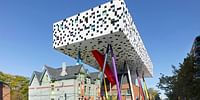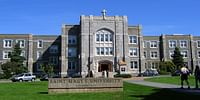This program offers an exciting opportunity for students to earn a Master's degree while gaining experience working and researching in industry. Students will take courses that will both prepare them for a work internship and help them write a M.Sc. thesis. Students may also spend up to eight months at a work internship gaining valuable experience in industry. They will then return to Acadia to complete a thesis, usually to be based on the research they completed during their internship. What makes this program so exciting for prospective students is the wide range of research that faculty at Acadia pursue. In our department, you can pursue research into a game of cops and robbers, unbreakable codes, tidal energy in the Bay of Fundy, fractal images, improving medicines, job scheduling, statistical learning and big data, and an optical computer.Master of Science in Applied Mathematics & Statistics students complete 1 four-month work term (with an optional second). Students enrol in Co-op in September of their 1st year of study. All Co-op students attend workshops and receive one-on-one coaching in job preparation skills such as resume and cover letter writing, interview preparation, business ethics, and more.Each Co-op work term is a non-credit course, with applicable tuition fees, that is recognized on the student's transcript of marks.
Master of Science [M.S] (Mathematics and Statistics)
2 years
Co Op
English
Field of Study:
₹8.4 L/Yr
CA$13,747 /Yr
Important Dates
| Event | End Date |
| Application Deadline For Winter Intake | Sep 15, 2023 |
Fees & Funding
Tution & Application Fees
| Year | Year 1 | Year 2 |
| Tuition Fees | ₹844066 | ₹844066 |
| Total Fees | ₹844066 | ₹844066 |
Course Guides
Masters (MS) in Canada: Fees 2023, Top Colleges, Admissions, Placements & Salaries
Masters in Mathematics in Canada: Fees 2023, Top Colleges, Placements & Salaries
Scholarship Grants & Financial Aids
| Name | Amount | International Students Eligible | Application Deadline |
| Australia Awards Scholarship | Variable | Yes | N/A |
| Debesh Kamal Scholarship | ₹85039 | Yes | N/A |
| Prodigy Finance-GyanDhan Scholarship | ₹153500 | No | Aug 31, 2023 |
| Rotary Foundation Scholarships- Global Grants | Variable | Yes | Jun 30, 2023 |
Ask your question
Similar Colleges You Might Be Interested In
- Similar Colleges
No Ratings Found!!
Follow
No Ratings Found!!
Follow
No Ratings Found!!
Follow
No Ratings Found!!
Follow
No Ratings Found!!
Follow
No Ratings Found!!
Follow
No Ratings Found!!
Follow
.jpeg?tr=h-94,w-94,c-force)





.jpeg?tr=h-100,w-200,c-force)






